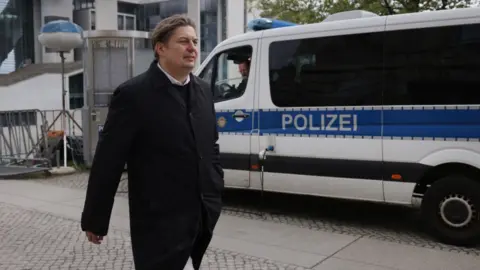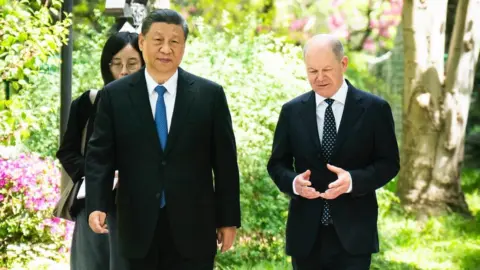Germany grapples with wave of spying threats from Russia and China
WORLD 29 April 2024 - 00:04
BBC carries an article about six suspected spies who have been arrested in Germany this month, in what has become a torrent of allegations of Russian and Chinese espionage, Caliber.Az reprints the article.
Six suspected spies have been arrested in Germany this month alone, in what has become a torrent of allegations of Russian and Chinese espionage.
For the far-right Alternative for Germany (AfD) party it has proved especially embarrassing, because their top two candidates for the European elections in June have been caught in the crosshairs.
An aide to MEP Maximilian Krah, who heads the party's list, has been arrested on suspicion of spying for China. Jian G is accused of being an "employee of a Chinese secret service".
Prosecutors have also begun preliminary investigations into the politician himself over alleged payments from pro-Russian and Chinese sources. Mr Krah denies any wrongdoing.
Days earlier, Petr Bystron, the second name on the AfD list, denied allegations that he received cash from the Voice of Europe website, alleged by European intelligence to have been a front for Russian intelligence.
But the allegations go well beyond the AfD.
Two German nationals of Russian origin have been arrested on suspicion of plotting to sabotage Germany's military aid to Ukraine while three Germans have been detained for allegedly planning to pass on advanced engine designs to Chinese intelligence.

"It is really unusual to have detentions of three networks [allegedly] engaged in some sort of espionage for Russia and China coming almost at the same time," said Noura Chalati, a research fellow at the Leibniz Centre for the Modern Orient.
In all three espionage cases, the efforts of Germany's BfV domestic intelligence agency are believed to have been crucial.
"Our security authorities… have massively strengthened their counter-espionage efforts," Interior Minister Nancy Faeser said.
The arrests came hard on the heels of Chancellor Olaf Scholz's return from wide-ranging talks with China's President Xi Jinping in Beijing.
'Arrest always a political decision'
Andrei Soldatov, an expert on the Russian security services, believes the case of the Russian-German pair could reflect a desire by the Kremlin escalate attacks on aid to Ukraine.
"It is just a completely new level of escalation," Mr Soldatov told the BBC. "These people [allegedly] collected information to help organise sabotage operations against military facilities on German soil."
Meanwhile, Roderich Kiesewetter, a former German Army officer who is now an opposition MP, alleged China was seeking to gain access to advanced research that could be useful for military or other purposes.
"China sees opportunities to exploit Germany's openness to access our knowledge and technology," he told the BBC.
Even so, Andrei Soldatov believes Berlin is putting down a marker.
"An arrest is always a political decision," he says.
"Counter-intelligence agencies in all countries prefer not to arrest people because it's better to follow them and monitor their activities in order to learn more about their networks and their activities."

One reason the political decision may have been taken is that Germany's adversaries - particularly Russia - have appeared increasingly keen to publicly humiliate Berlin as it has become more assertive in its foreign relations.
A particular low point was the leaking in March by Russian sources of a phone call between top generals discussing supplying long-range Taurus missiles to Ukraine.
Months earlier a high-ranking official in Germany's BND foreign intelligence service called Carsten L went on trial, accused of leaking classified information to the Russians in exchange for payments of some €400,000 (£343,000).
Former UK Defence Secretary Ben Wallace expressed the frustration of many allies when he said Germany was "pretty penetrated by Russian intelligence" and "neither secure nor reliable".
Roderich Kiesewetter says he worries about allies viewing Germany as untrustworthy. "We need to be a favoured partner," he told the BBC. "We cannot afford a German-free secret services co-operation."
Very public crackdowns on suspected spies may be one way to send a signal to friend and foe alike that Berlin is taking security seriously.
The BND and BfV said they did not comment on ongoing operations. The interior ministry did not respond to a request for comment.
Legacy of history
Germany's intelligence agencies have long been frustrated by more extensive restrictions on how they can act than many of their counterparts in other Western countries.
In part, that is a legacy of communist rule in the former East Germany - widely considered one of the most surveilled societies in history. It is estimated that one in 6.5 East Germans was an informant for the secret police, known as the Stasi.
When the extent of Stasi spying was revealed following the fall of the Berlin Wall, strong legal limits on the intelligence services were imposed.

These restrictions largely remain, although some have since been weakened.
Human rights advocates see those limitations as a good thing that protects citizens' right to privacy. But the intelligence services have long complained they are unable to act effectively because of the controls on their behaviour.
Last year, two former heads of the BND wrote: "The German intelligence services, particularly the BND, now suffer from excessive oversight."
Some in the intelligence services see the recent high-profile arrests as a way of highlighting the extent of hostile foreign infiltration in Germany - and as a chance of boosting their argument for more powers.
The extent of this infiltration, says Mr Kiesewetter, is in part a legacy of political "naivety" that followed the end of the Cold War.
"Since 1990, there was the idea that Germany is surrounded by friends."
Leaders were focused on business deals, including with autocratic countries such as Russia, and took their eye off national security, he explained.
'Not asleep any more'
Rafael Loss of the European Council on Foreign Relations is more specific about what went wrong.
German intelligence entirely wound down a unit dedicated to counter-intelligence in 2002 under Chancellor Gerhard Schröder.
"It is remarkable that this entire unit of roughly 60 people was completely disbanded," Mr Loss says.
But things are changing. The BfV's staffing has doubled in the past 10 years. The recent spate of detentions shows that the intelligence services are becoming more assertive in a country whose political culture has traditionally been wary of them.
"All the arrests at once send a good signal to the nations that spy on us," said Felix Neumann of the Konrad Adenauer Foundation.
"Germany is awake and not asleep any more."
Caliber.Az
|
1
|
Armenian priest willing to come to power intensifies activity demanding to oust Armenian PM
12 May 2024 - 17:06
|
|
2
|
Azerbaijani and Armenian FMs' Almaty talks - a big step towards a peace deal? Foreign experts weigh in
12 May 2024 - 11:48
|
|
3
|
Azerbaijan's pivot toward Central Asia Interregional interaction
11 May 2024 - 09:17
|
|
4
|
Prospects for peace treaty signing between Azerbaijan, Armenia Experts weigh in
11 May 2024 - 15:05
|
|
5
|
Azerbaijanis returning to Shusha while Armenia faces protests led by Archbishop Caliber.Az weekly review
12 May 2024 - 12:21
|
Dangers of dollar nationalism hang over world economy
14 May 2024 - 07:03
How Germany plans to end homelessness
14 May 2024 - 05:10
The Economist: America is in midst of extraordinary startup boom
14 May 2024 - 03:06
NATO cannot survive without America
Analysis by Foreign Affairs14 May 2024 - 01:04
Russian air defense shoots down Ukrainian Su-27 but loses Ka-52
13 May 2024 - 23:02
Türkiye “neutralizes” 3 PKK/YPG terrorists in northern Iraq
VIDEO13 May 2024 - 20:58
Azerbaijan to open another trade house in China
13 May 2024 - 20:43
Armenian premier in Denmark to attend Copenhagen Democracy Summit
13 May 2024 - 20:36
Spain prepares new military aid to Ukraine
13 May 2024 - 20:32
Erdogan says Ankara and Athens have no unsolvable problems
13 May 2024 - 20:24
Envoy: Argentina backs process of Baku-Yerevan normalisation
13 May 2024 - 20:16
VII int’l music festival Kharibulbul thrives in Lachin, showcasing Azerbaijani artistry & tradition
13 May 2024 - 20:07
Lavrov: Russia ready to fight West on battlefield
13 May 2024 - 19:59
Police in Armenia release detainees of revanchist rallies
UPDATED13 May 2024 - 19:50
Germany rejects idea to close part of skies over Ukraine
13 May 2024 - 19:40
Azerbaijan plans to resettle 50 families in Khojaly soon
13 May 2024 - 19:21
President Ilham Aliyev: Helping small island states is our moral duty
13 May 2024 - 19:10
Media: Niger, Iran hold secret talks on supply of nuclear raw materials
13 May 2024 - 19:02
US imposes sanctions on 37 more Chinese companies
13 May 2024 - 18:43
Azerbaijani MPs forge stronger ties with TRNC during Lefkosa visit
13 May 2024 - 18:37
Israel developing platform to control swarms of drones
13 May 2024 - 18:28
Media: North Korea hands over 6,700 containers with ammunition to Russia
13 May 2024 - 18:11
Russian defence minister appointed Security Council's secretary
13 May 2024 - 17:53
Shusha's significance for Azerbaijan & President Aliyev's call for regional stability
Amid French arms supplies to Armenia13 May 2024 - 17:21
Armenian FM highlights constructive atmosphere in talks with Azerbaijan
13 May 2024 - 17:11
Protests escalate over foreign agents law
Geopolitical struggle in Georgia13 May 2024 - 17:05
Swedish PM acknowledges possibility of nuclear weapons deployment in military conflict
13 May 2024 - 16:49
European Parliament member pays visit to Azerbaijan
13 May 2024 - 16:31
Media: Türkiye offers to resume talks on Ukraine
13 May 2024 - 16:16
Armenian premier meets OSCE Chairman-in-Office to discuss co-op & regional developments
13 May 2024 - 15:57
Azerbaijan reveals industrial production figures for 4 months of 2024
13 May 2024 - 15:39
ANAMA demining report: Progress & discoveries in liberated territories
13 May 2024 - 15:21
Türkiye’s growing defence industry despite tensions with the West
Phoenix is rising13 May 2024 - 15:06
Tehran says ready to change its nuclear doctrine
13 May 2024 - 14:52
Balancing CSTO/EAEU against EU/NATO integration
Armenia at crossroads13 May 2024 - 14:38
At least 19 Belgorod residents killed in Ukrainian shelling attacks
Governor says13 May 2024 - 14:24
Georgian opposition holds meeting with European emissaries
13 May 2024 - 14:10
Azerbaijani president approves unified register for small & medium-sized businesses
Presidential decree13 May 2024 - 13:56
Türkiye unveils BARKAN unmanned ground vehicle with integrated weapon system
PHOTO/VIDEO13 May 2024 - 13:42
Russian peacekeepers continue withdrawal from Azerbaijan, equipment seen leaving Khojaly
13 May 2024 - 13:35
